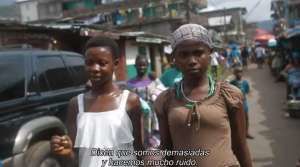In Sierra Leone, Salesian missionaries are working to extract girls working as prostitutes from their lifestyle, providing them with shelter and helping them to be reunited with family members or placed in adoptive homes.
In 2016, Salesian missionaries working in Freetown realized there was a large number of girls who were selling their bodies to get food.
“The youngest was 9 years old, and the oldest 17. Then the idea came up of creating a shelter as an alternative environment for them to help them get out of prostitution. They sell their bodies to earn $1.80 to $2.50 a day to pay for school because a lot of them go to school just like any other child,” Fr. Jorge Mario Crisafulli explained.
The Salesian priest is the director of their Don Bosco Fambul Center for the Protection of Minors. He recently visited several European cities to present “Love,” a short Spanish language documentary which shows the suffering of girls forced to prostitute themselves and who are rescued from the streets.
The priest has spent 23 years in Africa, and has been in Sierra Leone for three years.
“We have nine programs to help boys and girls living in difficult or emergency situations. Programs for those who have been abused, for Ebola orphans, and even a telephone hotline to take calls from children in a crisis. We are also present in the main prison in Freetown.” The Salesians also have “a bus used to reach out to children who live on the street and prostitute themselves,” he told ACI Prensa, CNA's Spanish language sister agency during his brief visit to Rome.
Thanks to their tireless work they have already succeeded in getting 146 girls out of prostitution, although “to just save one, all the effort would be worth it.”
There are many orphans in Sierra Leone, owing to the country's 1991-2002 civil war as well as a 2014 Ebola outbreak, and many have turned to prostitution as a way to support themselves.
Fr. Crisafulli said that they have already reached out to more than 900 girls who live in this type of slavery.
“I always tell all the the social workers and the Salesians that they mustn't forget that we are a Salesian community, that we are the Church and we are living out the Salesian charism, which is to help the most vulnerable … Sierra Leone is a country that has suffered a lot, and our mission goes beyond what an NGO does; we are convinced that we are a religious community, doing a mission confided by the Holy Spirit to Don Bosco,” he said.
“I also tell the girls to not think they are trash or bad, as many people tell them, but that they are children of God. We absorb the pain, we travel the streets, and give that pain over to Jesus.”
“The love that we offer is that of transforming the pain of the cross into redemption,” he said.
That is what is shown in “Love,” a short documentary that tells the story of Aminata, one of those underage girls who succeeded in getting out of prostitution and has turned her life around.
The documentary seeks to make that reality known and to show how reintegration into society is possible for these minors.
“You don't need prostitute yourself to eat, you don't need to prostitute yourself to get an education, what you need to do is to look for a merciful hand which has no other interest than to do good and help,” Fr. Crisafulli emphasized.
“The social workers do a great job of listening,” he said, “so the girls are able to tell what they have gone through on the streets and why they are prostituting themselves and that is already liberating.”
“Then you have to heal the profound traumas that each one of them has. But it is also a spiritual work. Many of them have told me, 'God had forgotten me' or 'God doesn't love me.' Our work also consists in telling them that that's not true, that God still loves them,” Fr. Crisafulli said.
It is important “to invite them to dream and find something to motivate them to get out of prostitution: going back to school, finishing high school, having a small business, or returning to their families,” he explained.
“It's true these are not all success stories, because six of them have gone back to the streets, but we don't throw in the towel. Our intention is never to give up, until we see them out of prostitution.”

